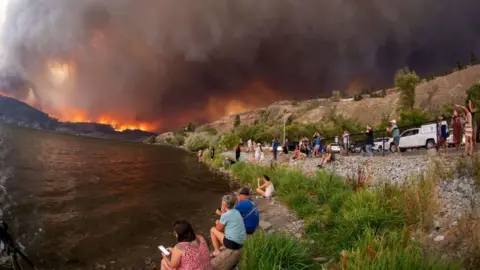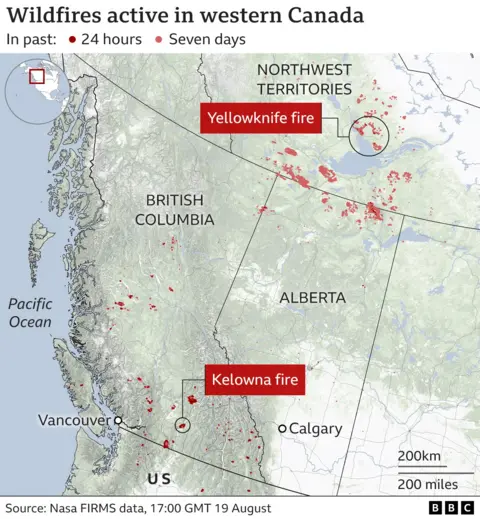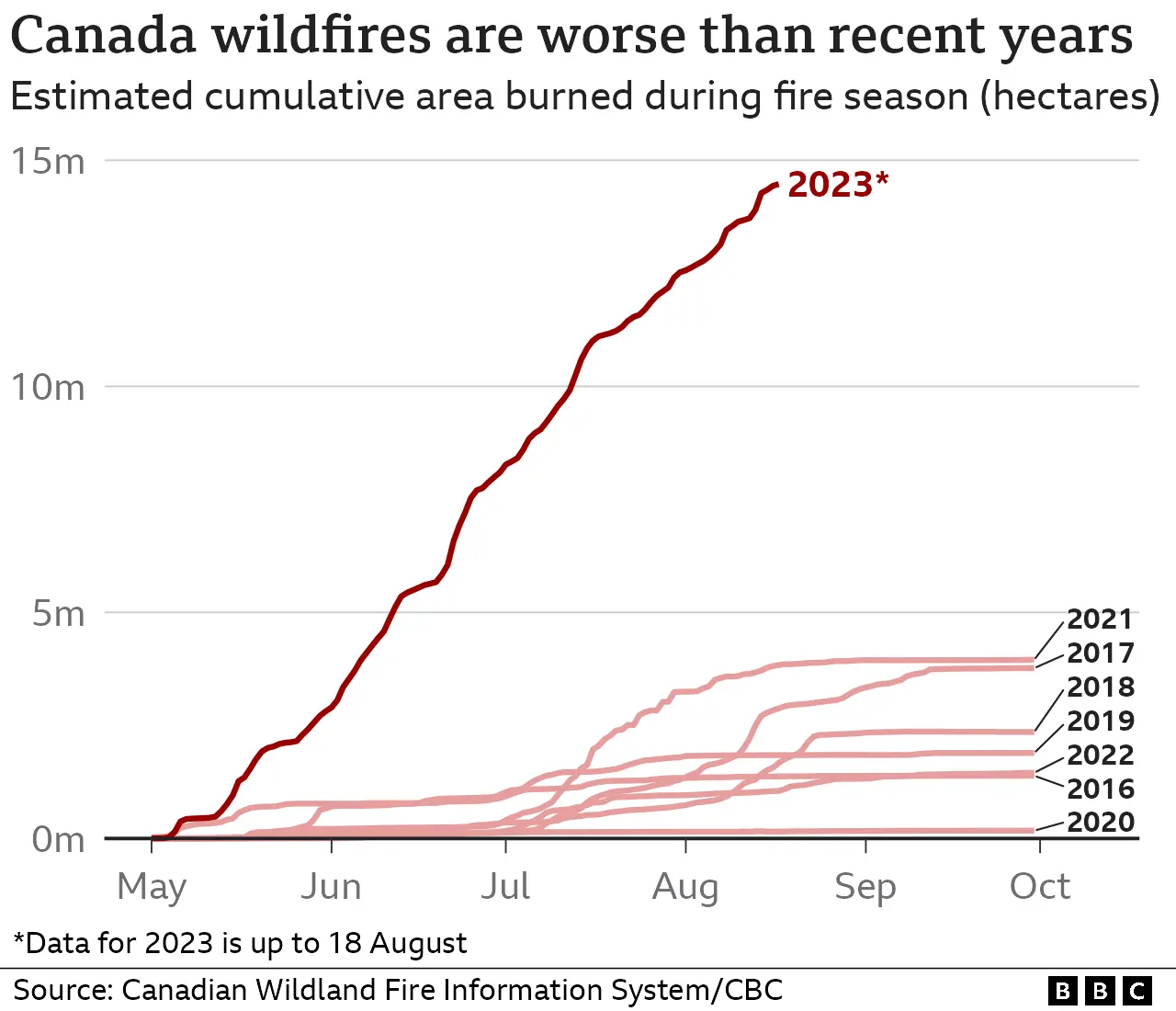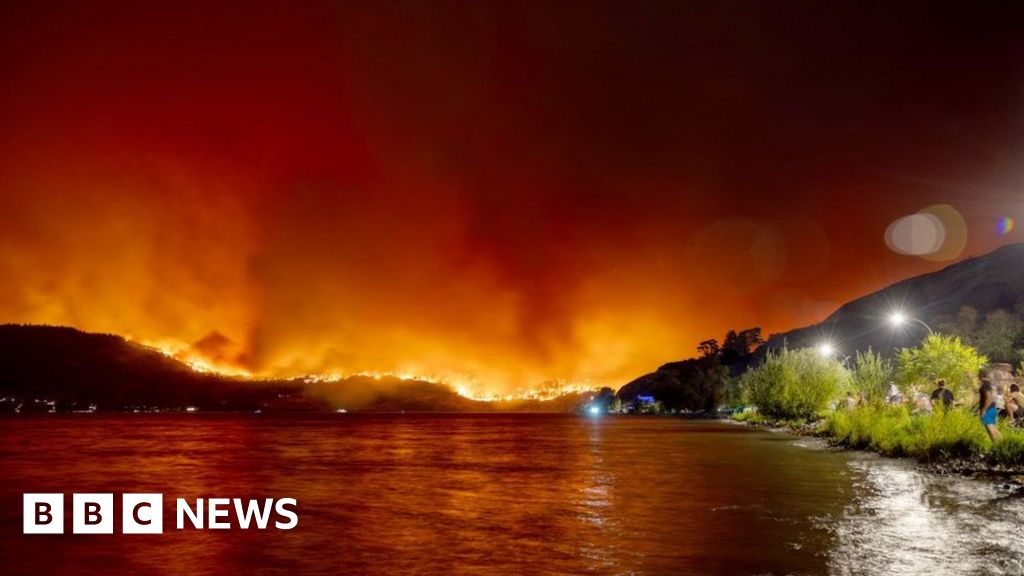By Jaroslav Lukiv & Aoife Walsh, BBC News
About 15,000 homes have been ordered to evacuate in British Columbia, Canada, as firefighters battle fierce wildfires that have burned homes.
Authorities said a “significant” number of buildings caught fire in West Kelowna, a city of 36,000, and more than 2,400 homes were evacuated.
A state of emergency has been declared across the province, where hundreds of separate fires are burning.
Hundreds of kilometers to the north, a huge fire boundary towards the city of Yellowknife.
The official deadline to evacuate the city – the capital of Canada’s Northwest Territories – expired on Friday. A local official said later in the day that almost all residents had left, either by car or plane.
About 19,000 of the town’s 20,000 residents have been evacuated, Territorial Environment and Communities Minister Shane Thompson told reporters.
“Some are choosing to shelter in place. If you are still in Yellowknife and are not essential to the emergency response, please evacuate,” Thompson said.
He warned that highways and airports could be affected by wildfires.
In British Columbia, evacuation orders went from 4,000 homes Friday afternoon to about 15,000 in the span of an hour. Another 20,000 households are on alert.
The province’s premier, David Eby, said that evening that the situation had “evolved rapidly” and officials were preparing for “an extremely difficult situation in the days to come.”
“This year we are facing the worst #BCWildfire season ever,” Mr. Eby wrote in a post on X, formerly known as Twitter. “Given the rapidly evolving situation, we are declaring a provincial state of emergency.”
The Prime Minister said this would ensure “we are able to quickly access all the tools we need to support communities”.
He said more people were being evacuated, warning that “emergency orders could include travel restrictions in specific areas if people do not heed our calls to avoid non-essential travel.”
 Getty Images
Getty ImagesCanada is experiencing its worst wildfire season on record, with at least 1,000 fires across the country, according to the Canadian Interagency Wildfire Center (CIFFC).
Experts say climate change increases the risk of hot, dry weather that could fuel wildfires.
Extreme, long-lasting heat draws more and more moisture from the ground, which can fuel fires that can spread incredibly quickly, especially if winds are strong.
Earlier, West Kelowna Fire Chief Jason Brolund called the wildfire “devastating.”
“We fought hard last night to protect our community. We fought 100 years of fires in one night,” he added.
Local authorities have already reported “significant structural losses” in the area, including in Trader’s Cove, just north of West Kelowna.
No deaths have been reported so far.
Juliana Loewen lives in Kelowna, a larger sister city of West Kelowna, on the east shore of Okanagan Lake. She told the BBC how residents watched a plume of smoke rise up the mountainside like an “ominous cloud of destruction” and how some on the Trader’s Cove side jumped into the lake as the fire spread and that the exit routes were blocked.
Her brother and grandmother fled to her house after “the fire spread very quickly from a tree to an entire area, threatening an entire residential community.”
Local residents are accustomed to fires due to the “California-style climate” in the area – but the heat, dryness and wind seen in recent days have created the “perfect conditions for a firestorm”, Ms Loewen added .
The airspace around the Kelowna International Airport is now closed to everyone except aerial firefighters.



Are you personally affected by the wildfires in Canada? If it is safe to do so, you can contact us by email haveyoursay@bbc.co.uk.
Please include a telephone number if you would like to speak to a BBC journalist. You can also contact us in the following ways:
If you are reading this page and do not see the form, you will need to visit the mobile version of the BBC website to submit your question or comment or you can email us at HaveYourSay@bbc.co.uk. Please include your name, age and location with any submission.

“Unapologetic travel lover. Friendly web nerd. Typical creator. Lifelong bacon fanatic. Devoted food enthusiast. Wannabe tv maven.”


:strip_icc():format(jpeg)/kly-media-production/medias/4889148/original/004013400_1720683504-firman_1.jpg)




